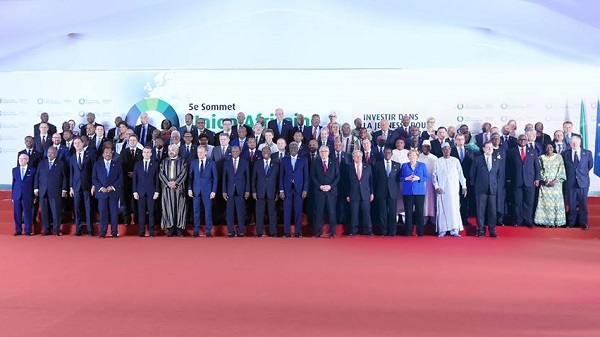
Following footage of a slave auction in Libya, European leaders vow to work with African countries to address illegal migration in Africa during an AU-EU summit. European leaders also hope to stem the tide of migrants heading to Europe.
By Lorne Cook (Associated Press)
ABIDJAN, Ivory Coast (The Christian Science Monitor)–European Union leaders launched high-level talks Wednesday with their African counterparts on migration, seeking to portray themselves as pragmatic partners but desperate to stem the flow of thousands setting out on dangerous voyages across the Mediterranean in search of better lives in Europe.
The leaders of France, Belgium, and Luxembourg tried to distance themselves from Europe’s dark colonial past in Africa, pledging to do business and invest in development and security on the continent and tackle the root causes of migration.
Migration is a key issue at the African Union – Europe Union Summit (AU-EU Summit) in Ivory Coast, pushed further into the public eye after recent footage of migrants at a slave auction in Libya drew international horror and condemnation.
“It’s very important that we simply support Africans to put a stop to illegal migration, so people don’t have to either suffer in horrible camps in Libya or are even being traded,” German Chancellor Angela Merkel said at the start of the two-day AU-EU summit in Abidjan.
On the eve of the meeting, French President Emmanuel Macron called the trafficking of African migrants a “crime against humanity” as he made his first major address on the continent before a crowd of university students in Burkina Faso.
VIDEO: CGTN Africa
Mr. Macron said he wants “Africa and Europe to help populations trapped in Libya by providing massive support to the evacuation of endangered people.” He did not elaborate, saying he would formally detail his proposal during the summit.
Already Burkina Faso’s foreign affairs minister has recalled his ambassador from Libya, calling it “unacceptable to have slaves in this 21st century.”
Europe has struggled to slow the flow of tens of thousands of Africans making the dangerous crossing of the Mediterranean through development aid and other means, including funds to tighten border controls. But many Africans feel pressured to make the journey, risking death and abuse, saying high unemployment and climate change leave them little choice.
Read the complete story at The Christian Science Monitor
——
See also:
- Ethiopia, UK Partnering to Tackle Human Trafficking
- Can Economic Growth Lead Ethiopia Out of Illegal Migration Fever?
- ECA and Rome-based UN agencies commit to fighting food insecurity in Africa under shared framework
- African Development Bank Approves $97.79 Million for Financing Energy Transmission and Distribution Upgrade in Ethiopia
- EU Special Rep. for Human Rights Stavros Lambrinidis Visits Ethiopia to Launch Strategic Engagement on Human Rights and Governance
